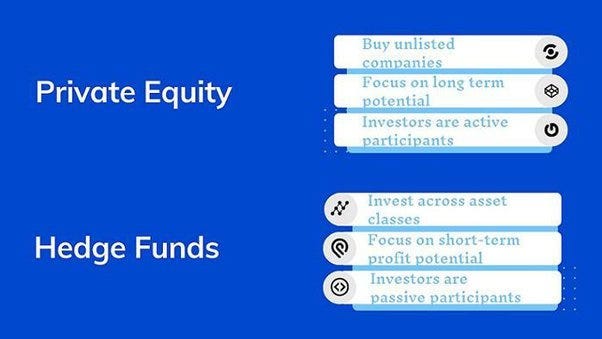views
Hedge Funds and Private Equity: A Comprehensive Guide

Hedge funds and private equity are two of the most prominent alternative investment vehicles available to investors. They are often lumped together, but there are significant differences between the two. In this article, we will delve into what hedge funds and private equity are, how they differ, and what their advantages and disadvantages are.
What are Hedge Funds?
A hedge fund is an investment fund that pools capital from accredited investors or institutional investors and uses a variety of strategies to generate high returns. Hedge funds are known for their ability to take advantage of market inefficiencies and opportunities. They can use leverage and derivatives to magnify returns, and they can also short stocks or other securities to make money when prices fall.
Hedge funds are typically structured as limited partnerships, with the general partner managing the fund’s assets and the limited partners providing the capital. The general partner is compensated through a combination of management fees and performance fees, which are typically 2% and 20% of assets under management, respectively.
What is Private Equity?
Private equity, on the other hand, is an investment in privately held companies or public companies that are taken private. Private equity firms raise capital from institutional investors and high-net-worth individuals and use it to acquire companies, usually with the goal of improving their performance and selling them at a profit.
Private equity firms typically use a combination of debt and equity to finance their acquisitions, and they usually take a hands-on approach to managing the companies they acquire. They may replace the existing management team, cut costs, streamline operations, and make other changes to increase the company’s value.
Key Differences between Hedge Funds and Private Equity
The primary difference between hedge funds and private equity is the type of investment they make. Hedge funds invest in publicly traded securities and use a variety of strategies to generate returns, while private equity invests in private companies or public companies that are taken private and focuses on improving their operations and profitability.
Another key difference is the fee structure. Hedge funds typically charge a 2% management fee and a 20% performance fee, while private equity firms charge a management fee of 1–2% and a carried interest of 20% on profits.
Advantages and Disadvantages of Hedge Funds
One of the main advantages of hedge funds is their ability to generate high returns. Because they can use leverage and derivatives, they can magnify their returns and take advantage of market inefficiencies. Another advantage is their flexibility. Hedge funds can invest in a wide range of assets, including equities, bonds, commodities, and currencies.
However, there are also several disadvantages to hedge funds. They are often highly leveraged, which can magnify losses as well as gains. They are also subject to significant regulation and may be restricted in the types of investments they can make. Finally, hedge funds are only available to accredited investors, which limits their potential investor base.
Advantages and Disadvantages of Private Equity
One of the main advantages of private equity is the potential for high returns. Because private equity firms take a hands-on approach to managing their investments, they can often improve the performance of the companies they acquire and sell them at a significant profit. Another advantage is the long-term nature of the investments. Private equity firms typically hold their investments for several years, which allows them to focus on long-term value creation.
However, there are also several disadvantages to private equity. The investments are illiquid, which means that investors may not be able to sell their shares for several years. The investments are also subject to significant risk, as private companies are often less transparent than public companies. Finally, private equity is only available to institutional investors and high-net-worth individuals, which limits its potential investor base.
Do you want to To promote your business?
Get Your Business Featured at businessdor.com/get-featured/
Businessd’Or is a media company focused on business, innovation, investment, technology, entrepreneurship, leadership and lifestyle.











